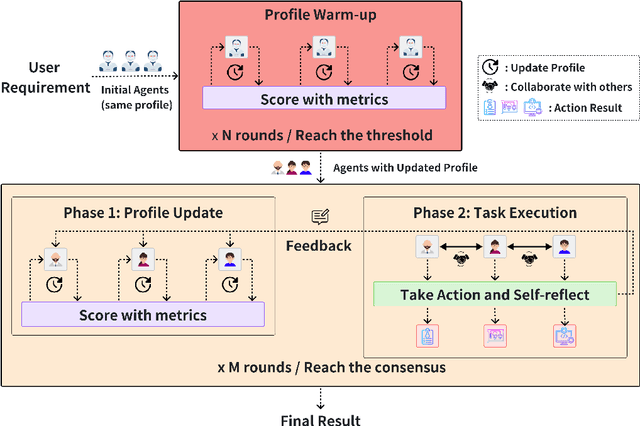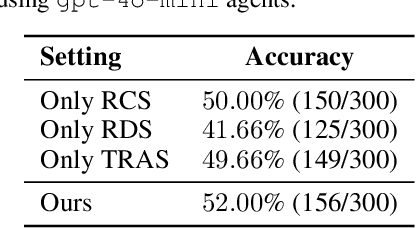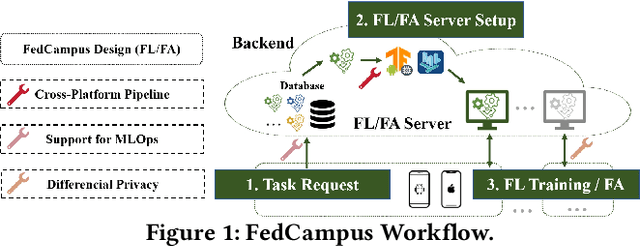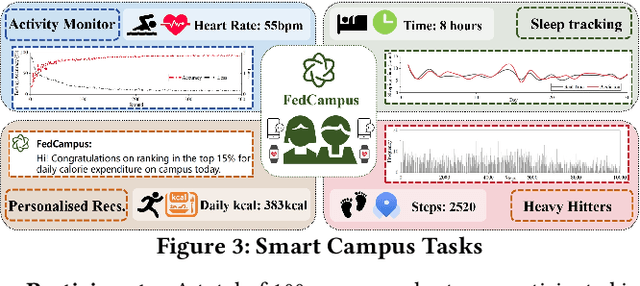Jiaqi Shao
FoldAct: Efficient and Stable Context Folding for Long-Horizon Search Agents
Dec 28, 2025Abstract:Long-horizon reinforcement learning (RL) for large language models faces critical scalability challenges from unbounded context growth, leading to context folding methods that compress interaction history during task execution. However, existing approaches treat summary actions as standard actions, overlooking that summaries fundamentally modify the agent's future observation space, creating a policy-dependent, non-stationary observation distribution that violates core RL assumptions. This introduces three fundamental challenges: (1) gradient dilution where summary tokens receive insufficient training signal, (2) self-conditioning where policy updates change summary distributions, creating a vicious cycle of training collapse, and (3) computational cost from processing unique contexts at each turn. We introduce \textbf{FoldAct}\footnote{https://github.com/SHAO-Jiaqi757/FoldAct}, a framework that explicitly addresses these challenges through three key innovations: separated loss computation for independent gradient signals on summary and action tokens, full context consistency loss to reduce distribution shift, and selective segment training to reduce computational cost. Our method enables stable training of long-horizon search agents with context folding, addressing the non-stationary observation problem while improving training efficiency with 5.19$\times$ speedup.
Do LLM Agents Know How to Ground, Recover, and Assess? A Benchmark for Epistemic Competence in Information-Seeking Agents
Sep 26, 2025Abstract:Recent work has explored training Large Language Model (LLM) search agents with reinforcement learning (RL) for open-domain question answering (QA). However, most evaluations focus solely on final answer accuracy, overlooking how these agents reason with and act on external evidence. We introduce SeekBench, the first benchmark for evaluating the \textit{epistemic competence} of LLM search agents through step-level analysis of their response traces. SeekBench comprises 190 expert-annotated traces with over 1,800 response steps generated by LLM search agents, each enriched with evidence annotations for granular analysis of whether agents (1) generate reasoning steps grounded in observed evidence, (2) adaptively reformulate searches to recover from low-quality results, and (3) have proper calibration to correctly assess whether the current evidence is sufficient for providing an answer.
Distribution-Aware Compensation Design for Sustainable Data Rights in Machine Learning
Oct 24, 2024Abstract:Modern distributed learning systems face a critical challenge when clients request the removal of their data influence from trained models, as this process can significantly destabilize system performance and affect remaining participants. We propose an innovative mechanism that views this challenge through the lens of game theory, establishing a leader-follower framework where a central coordinator provides strategic incentives to maintain system stability during data removal operations. Our approach quantifies the ripple effects of data removal through a comprehensive analytical model that captures both system-wide and participant-specific impacts. We establish mathematical foundations for measuring participant utility and system outcomes, revealing critical insights into how data diversity influences both individual decisions and overall system stability. The framework incorporates a computationally efficient solution method that addresses the inherent complexity of optimizing participant interactions and resource allocation.
Mind the Remaining: Mechanism Design for Robust Federated Unlearning
Oct 19, 2024Abstract:Federated Unlearning (FU) aims to remove target clients' influence from trained models for privacy regulations. However, due to data distribution shifts, it can introduce side effects, including global model performance degradation and uneven impacts on the remaining clients. These effects potentially cause remaining clients to deviate, threatening the system's robustness. To address these challenges, we present a novel and robust mechanism modeling a Stackelberg game for FU. In this game, the server designs an optimal payment to stimulate remaining clients to participate in FU, ensuring unlearning effectiveness and stability. In response, the remaining clients strategically determine their participation level to maximize profit, accounting for offered payments and unlearning impacts. In modeling FU outcomes, we develop, for the first time, a comprehensive framework analytically capturing FU-induced side effects for both the server and clients. Based on this, we establish utility functions for the server and clients in FU, inherently determining their dynamic strategic decision-making. Our rigorous equilibrium analysis reveals how data heterogeneity affects the side effects in their utility and decision-making. Additionally, we develop a low-complexity algorithm for the non-convex optimization problem, enabling efficient computation of the equilibrium.
MorphAgent: Empowering Agents through Self-Evolving Profiles and Decentralized Collaboration
Oct 19, 2024



Abstract:Large Language Model (LLM) based multi-agent systems (MAS) have shown promise in tackling complex tasks, but often rely on predefined roles and centralized coordination, limiting their adaptability to evolving challenges. This paper introduces MorphAgent, a novel framework for decentralized multi-agent collaboration that enables agents to dynamically evolve their roles and capabilities. Our approach employs self-evolving agent profiles, optimized through three key metrics, guiding agents in refining their individual expertise while maintaining complementary team dynamics. MorphAgent implements a two-phase process: a warm-up phase for initial profile optimization, followed by a task execution phase where agents continuously adapt their roles based on task feedback. Our experimental results show that MorphAgent outperforms traditional static-role MAS in terms of task performance and adaptability to changing requirements, paving the way for more robust and versatile multi-agent collaborative systems. Our code will be publicly available at \url{https://github.com/LINs-lab/learn2collaborate}.
Demo: FedCampus: A Real-world Privacy-preserving Mobile Application for Smart Campus via Federated Learning & Analytics
Aug 31, 2024


Abstract:In this demo, we introduce FedCampus, a privacy-preserving mobile application for smart \underline{campus} with \underline{fed}erated learning (FL) and federated analytics (FA). FedCampus enables cross-platform on-device FL/FA for both iOS and Android, supporting continuously models and algorithms deployment (MLOps). Our app integrates privacy-preserving processed data via differential privacy (DP) from smartwatches, where the processed parameters are used for FL/FA through the FedCampus backend platform. We distributed 100 smartwatches to volunteers at Duke Kunshan University and have successfully completed a series of smart campus tasks featuring capabilities such as sleep tracking, physical activity monitoring, personalized recommendations, and heavy hitters. Our project is opensourced at https://github.com/FedCampus/FedCampus_Flutter. See the FedCampus video at https://youtu.be/k5iu46IjA38.
Cognitive Insights and Stable Coalition Matching for Fostering Multi-Agent Cooperation
May 28, 2024Abstract:Cognitive abilities, such as Theory of Mind (ToM), play a vital role in facilitating cooperation in human social interactions. However, our study reveals that agents with higher ToM abilities may not necessarily exhibit better cooperative behavior compared to those with lower ToM abilities. To address this challenge, we propose a novel matching coalition mechanism that leverages the strengths of agents with different ToM levels by explicitly considering belief alignment and specialized abilities when forming coalitions. Our proposed matching algorithm seeks to find stable coalitions that maximize the potential for cooperative behavior and ensure long-term viability. By incorporating cognitive insights into the design of multi-agent systems, our work demonstrates the potential of leveraging ToM to create more sophisticated and human-like coordination strategies that foster cooperation and improve overall system performance.
Federated Unlearning: a Perspective of Stability and Fairness
Feb 05, 2024Abstract:This paper explores the multifaceted consequences of federated unlearning (FU) with data heterogeneity. We introduce key metrics for FU assessment, concentrating on verification, global stability, and local fairness, and investigate the inherent trade-offs. Furthermore, we formulate the unlearning process with data heterogeneity through an optimization framework. Our key contribution lies in a comprehensive theoretical analysis of the trade-offs in FU and provides insights into data heterogeneity's impacts on FU. Leveraging these insights, we propose FU mechanisms to manage the trade-offs, guiding further development for FU mechanisms. We empirically validate that our FU mechanisms effectively balance trade-offs, confirming insights derived from our theoretical analysis.
 Add to Chrome
Add to Chrome Add to Firefox
Add to Firefox Add to Edge
Add to Edge